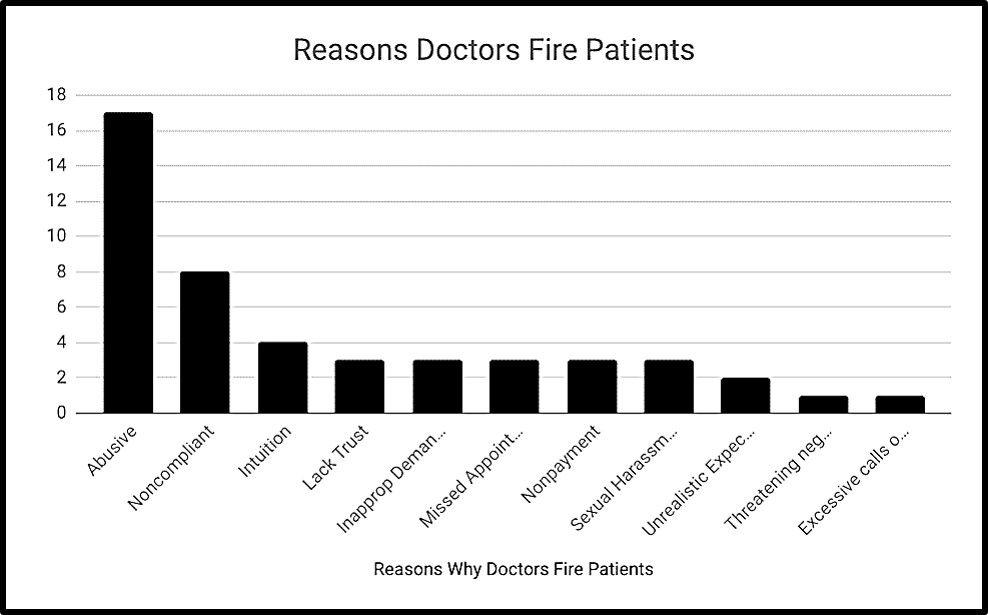- Clinical Technology
- Adult Immunization
- Hepatology
- Pediatric Immunization
- Screening
- Psychiatry
- Allergy
- Women's Health
- Cardiology
- Pediatrics
- Dermatology
- Endocrinology
- Pain Management
- Gastroenterology
- Infectious Disease
- Obesity Medicine
- Rheumatology
- Nephrology
- Neurology
- Pulmonology
Why Physicians Fire Patients: My Informal Survey
Only 1 respondent to this physician’s poll had never discharged a patient. Those who had cited abusive behavior, dangerous noncompliance, intuition, and more.
Figure 1 (please click to enlarge)

She was a stressed out single mother of 2 trying to make it in Los Angeles. On Friday afternoons she would call asking for the sedative lorazepam, to treat her intermittent anxiety. By the end of her phone call my assistant was frazzled and begging me to send in an emergency prescription. My offer was always the same, “I don’t care if it’s Friday. She needs to come in. I will wait for her.” She rarely came. One Friday afternoon she brought my assistant to tears. The line had been crossed and I promptly discharged her from the practice.
I recently polled 30 physicians and asked them to list reasons why they had discharged patients from their practices. Their work settings were academic or private, urban or suburban. There was no limit to the number of reasons given. Only 1 doctor had never discharged a patient.
The main reason why physicians dismiss patients is abuse to the medical staff or doctor (see figure 1). This was by far the reason listed most, appearing 17 times, with noncompliance following in second place. It was often the type of noncompliance that could seriously harm a patient, such as not reporting to an emergency department for chest pain when directed there by a physician.
Interestingly, the third most popular reason was physician intuition. This generally came from more experienced physicians and specialists. The reason may seem too general, and even a way to hide prejudice. But on further questioning, this gestalt was often connected to another listed reason such as unrealistic expectations. The unifying factor was always the origin of the referral. Physicians have a lower threshold for discharging patients if they are connected to a referring doctor with a toxic practice or are related to a certain family or friend group.
The reasons cited after abuse, noncompliance, and intuition were all lower in number and included: verbalized lack of trust in the physician, demand for inappropriate treatment, missed appointments, and sexual harassment. The least common reasons were: unrealistic expectations, threatening negative social media reviews, and excessive phone calls or emails.
Reasons that never appeared: Complexity of medical problems or lack of diagnosis.
So it seems that physicians are up for the challenge as long as they or their staff do not suffer abuse.
A few more points
It is perfectly legal for a physician to discharge a patient for any reason. Many states do not even require that the doctor give an explanation. The obligation to the patient is more of an ethical and moral duty. In my experience, the best way to discharge a patient is a phone call followed by a certified letter. If the phone call is not feasible, a letter will serve as notification and documentation. The letter should include the effective date, resources to find another physician, and instructions on how to obtain medical records.
There are certain exceptions to the legal discharge of a patient including violating a person’s civil rights by discriminating based on race, religion, or sexual orientation. Also, a physician may not withdraw during the treatment of an acute medical issue. For example, a doctor cannot stop caring for a patient during a hospital admission.
My best recommendation is to consult your malpractice carrier prior to discharging a patient and they can provide a wealth of advice and even letter templates. Finally, please do not forget that we will always remember the 0.01% of patients who give us trouble, but we still have the vast majority who are always a pleasure to care for.
